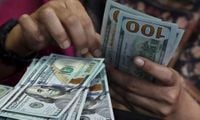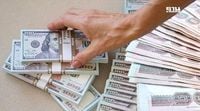On April 23, 2025, the Thai Baht opened the day at 33.63 THB per USD, marking a significant depreciation from the previous closing rate of 33.23 THB per USD. Poon Panichphibool, a market strategist at Krungthai GLOBAL MARKETS, highlighted that the rapid weakening of the Baht could begin to stabilize as exporters are expected to gradually sell dollars if the Baht weakens beyond the 33.50 THB per USD mark.
Market sentiment in the United States has shifted towards a risk-on environment, as concerns over trade tensions between the U.S. and China have eased. This change is reflected in the slight strengthening of the Chinese Yuan, which has shown a high correlation of approximately 80% with the Thai Baht over the last 30 days. If gold prices rebound or at least stabilize, it could also support the Baht against further depreciation.
However, pressures remain. The U.S. dollar is projected to continue strengthening if market participants regain confidence in U.S. assets, particularly ahead of the upcoming S&P PMI data, which could influence market dynamics. New resistance levels for the Baht are anticipated between 33.70-33.80 THB per USD, while support levels are expected around 33.30-33.40 THB per USD amid ongoing volatility in financial markets.
In recent trading, the USDTHB fluctuated around 33.50 THB per USD, with a range noted between 33.18-33.70 THB per USD. The market is closely monitoring statements from President Donald Trump and central bank leaders, which have contributed to a more cautious approach among investors. Trump’s recent remarks suggest uncertainty regarding future Federal Reserve policies, which could lead to increased market volatility.
In the U.S. stock markets, the S&P 500 index closed up 2.51%, reflecting renewed risk appetite following comments from Trump and the Treasury Secretary that alleviated fears surrounding the U.S.-China trade conflict. In Europe, the STOXX600 index rose by 0.25%, bolstered by stronger-than-expected corporate earnings reports, although shares of Novo Nordisk fell by 7.4% due to competitive pressures from Eli Lilly's new weight-loss drug.
Bond markets are also experiencing fluctuations in line with risk sentiment, with some investors choosing to reduce exposure to riskier assets. The 10-year U.S. bond yield has recently adjusted to around 4.35%, down from earlier highs of 4.40%. This shift reflects evolving market perceptions of economic stability in the wake of Trump's trade policies.
In the context of the Vietnamese Dong, the State Bank of Vietnam announced a decrease in the exchange rate to 24,877 VND per USD, a 30 VND reduction from the previous day. Meanwhile, the Dollar Index (DXY) rose by 1.36% to 99.64, indicating a strengthening dollar against a basket of major currencies.
Janet Yellen, the U.S. Treasury Secretary, expressed optimism about the easing of trade tensions with China during a private meeting at a JP Morgan conference. She described the ongoing trade discussions as a "war" that has yet to formally begin. Investor sentiment has been affected by the high tariffs currently in place, which the International Monetary Fund (IMF) recently cited as a reason for downgrading economic growth forecasts for the U.S., China, and other major economies.
On April 22, the IMF adjusted its growth projections, attributing the changes to the impact of U.S. tariffs, which are at their highest levels in a century. The market is also reacting to Trump's criticisms of Jerome Powell, the Federal Reserve Chair, who has been under pressure for not lowering interest rates quickly enough to support the economy.
Trump has publicly stated that he believes he could force Powell out of his position, further complicating the economic landscape. Neel Kashkari, President of the Minneapolis Federal Reserve, emphasized the importance of the Fed's independence, warning that excessive concerns about the economy could lead to reduced spending and potentially trigger a recession.
As the dollar strengthens, it has risen 0.42% to 141.470 JPY, overcoming a psychological barrier of 140 JPY for the first time since mid-September. This increase reflects growing demand for U.S. government bonds, even as the 10-year bond yield sits at 4.391%, down from earlier highs.
In the domestic Vietnamese market, the State Bank of Vietnam announced an increase in the exchange rate of the dong to 23,907 VND per USD, while commercial banks are offering rates from 23,684 VND to 26,070 VND for buying and selling the dollar. The exchange rates for other currencies, including the Euro and Yen, have also seen adjustments, reflecting ongoing shifts in the global currency markets.
Overall, market participants are advised to remain cautious and to monitor developments closely, as factors such as gold prices, U.S. trade policies, and the upcoming economic data releases will play crucial roles in shaping market sentiment in the days ahead.


